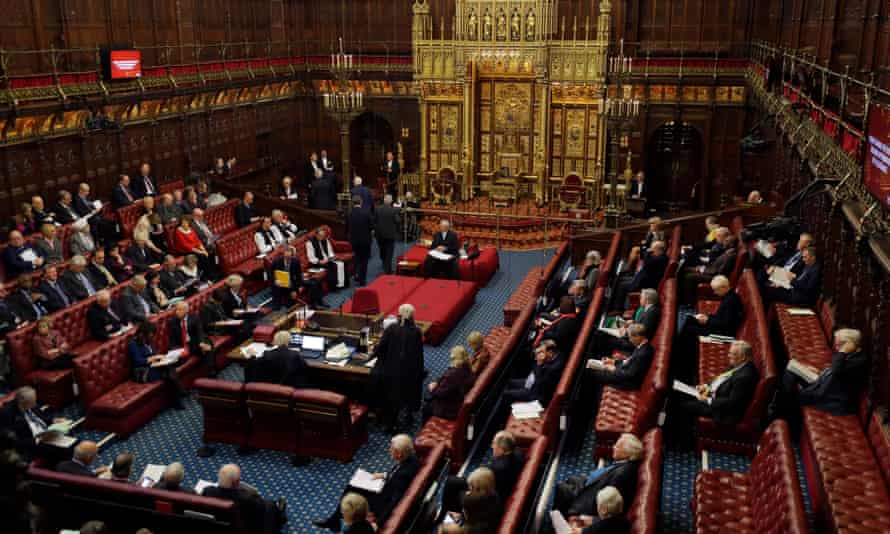When the House of Lords began holding virtual proceedings during the first lockdown last spring, there was a spate of videos popular on social media showing peers struggling with mute buttons or interrupted by computerised voices. But, 10 months on, it could be the upper house that has the last laugh.
While the Commons and the Lords now hold so-called hybrid sittings, where members can participate in the chamber or by video link, it is the Lords – with an average age of 70 – that has seemingly embraced the modern era more thoroughly.
MPs – average age nearer 50 – have to attend Westminster to vote, or trust a whip or fellow MP with a proxy. But since last June peers have been able to vote electronically. The system, known as PeerHub, has worked with barely a hiccup, recording more than 46,000 votes to date.
Perhaps more significantly, while Jacob Rees-Mogg, the leader of the Commons, appears set on a near full return to business as usual once the coronavirus crisis abates, the upper house seems more likely to maintain some of the innovations brought about by the pandemic.
John McFall, the former Labour MP who is senior deputy speaker in the Lords and chairs its procedure committee, says the chamber has a commitment to inclusive participation, and the option to speak remotely assists this.
When asked if video participation could continue once more normal life has returned, he told the Guardian: “As an officer in the House of Lords, I’m always careful in saying ‘this is going to happen’. But given that we have said equity is the guiding principle in this, if people can’t come then it’s a legitimate question to look at when we review the hybrid house sittings.”
The Commons also has yet to decide what format it will take after social distancing measures are eased, but Rees-Mogg has heavily hinted that he would like a full return to physical sessions, calling the hybrid version “a second-rate way of conducting business”.
This would not be popular among all MPs, with some set to push for a model that would have physical participation as the norm but allow for video speeches by people unable to attend, for example owing to illness, caring responsibilities or bad weather.
“We’ve demonstrated that it’s technically possible and perfectly effective,” says Caroline Lucas, the Green MP for Brighton Pavilion. “It’s not as good as being there, but it’s better than having no standing there at all. So definitely we should learn from that.”
Alison Thewliss, the SNP MP for Glasgow Central, also wants continued provision for some remote participation. With primary-age children, she says she has been “pretty much living in a corner of my living room” and has found virtual participation hugely efficient – despite the occasional mishap.
During one Treasury select committee session last summer, her children were playing in the street outside. “The second I started asking my question, my daughter thought it would be a good idea to start shouting ‘Mummy!’ through the window,” she recalls. “This was the precise second – not the other two hours of the meeting.”
Not all agree with remote participation. Richard Holden, the Conservative MP for North West Durham, and part of the 2019 intake of Tories, says video participation leads to “a series of short, set-piece speeches rather than a real debate”.
“My instinct is to say, let’s have everybody back in parliament, speaking in parliament,” Holden says. “That’s where we’re all sent. The default should be a return to normal, and if there are any changes, there have to be very strong arguments for them.”

While there are also dissenters in the Lords, the enthusiasm with which peers have taken on remote participation is shown by the fact that, on a few occasions, the chamber has only just maintained its quorum of three members physically present.
“Sometimes, if one of the government people wants to go to the loo, they have to bring in someone else,” says Jenny Jones, a Green peer.
Jones is one of the members who also likes to attend in person – “I find I can’t get my full fury across on broadband” – but she is full of praise for the Lords technical staff who have guided “IT-resistant” peers like herself into mastering the virtual system when needed.
“The House of Lords has taken to it thoroughly. In part that’s because the authorities saw a lot of the peers as vulnerable, and so they had to act,” she says. “And so, having barely moved for several hundred years, all of a sudden we have done a lot fast.”
Virtual parliament mishaps
-
In one early mix-up, the Labour life peer Lord Liddle sat in blank bemusement as his name was repeatedly called and he was urged to unmute. He missed his moment to speak as the time allocated for the debate in which he was trying to speak ran out.
-
The first virtual session in the Lords involved a technical mishap that was nothing to do with the peers’ efforts, as several times an electronic voice from the Microsoft Teams system interrupted speeches to read out some peers’ phone numbers.
-
Not a mishap, but perhaps an oddity: one early star of the virtual Lords was Labour’s Lady Hayter who, unable to have the House of Lords added as a digital backdrop, instead printed a giant photo of the chamber and propped it up behind her.


